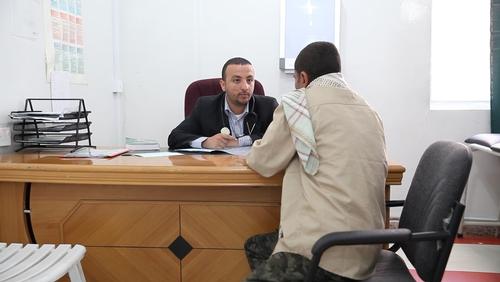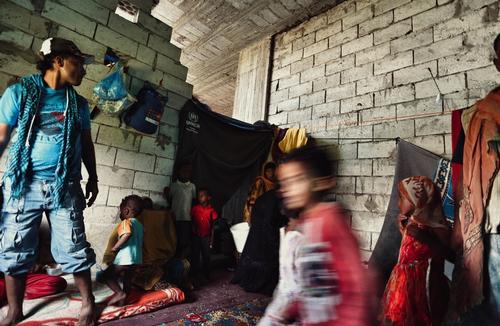In the poorest country in the Arabian Peninsula, more than 1,300 people living with HIV/AIDS are receiving antiretroviral (ARV) treatment, around half of them in the capital, Sana’a. With the outbreak of the war in March 2015, ensuring the continuity of the treatment is a critical challenge.
"On 26 March, at about 1 am, the bombings started in Yemen. Throughout the country. Not just in the capital, Sana'a, but also in the governorates of Sa’ada, Amran, Hajjah and Al-Dhale.
Not only did people living with the HIV virus in Yemen face the fear of war, they also faced the panic of having to interrupt their treatment with antiretroviral (ARV) drugs. In the days after the first bombings, many people came to the HIV/AIDS treatment clinic at Al-Gumhuri hospital – the only place where you can receive ARV drugs in Sana’a and where MSF has intermittently worked since 2010 – to collect their medicines. Many were planning to travel to their home towns in search of a safe place to be.
We immediately activated the contingency plan we had prepared for crisis situations in Sana'a, based on our previous experience in 2011, when protests against the president led to clashes that divided the city in two, and we had to get ARV drugs to all the people who could not get to the clinic.
Given the recent instability in the country, we had already taken many steps in 2014 to ensure that the people receiving treatment would not have to interrupt it: we regularly informed them about what to do in an emergency, updated all of the patients’ details, gave bags containing a two-month supply of treatment to people living in the most troubled areas, and we bolstered our supply of ARV drugs.
When the conflict escalated on 26 March we started calling the associations of people living with HIV/AIDS and the patients to find out how they were and if they could come to the clinic to pick up their medication. First, we called the patients who we knew were in the most unstable governorates, such as Sa’ada, Al-Dhale, Hajjah and Aden; then those living in the most difficult areas of the capital; and thirdly, people who had appointments at the clinic to pick up their medication in the coming months. By the beginning of April, we had managed to contact 745 of the 773 who were in treatment at that time in Sana’a. With the help of the HIV/AIDS associations and the International Organization for Migration, we were able to find many of those who did not respond.
Then we started to give a two-month supply of ARV drugs to all patients. Many were able to come to the clinic to collect them, but for many others this was impossible, because of the fighting or a lack of fuel or money to travel. So we sought the best way to meet them and give them their treatment. Abdulbaset, the nurse in charge of the pharmacy, and I delivered the drugs in several places, sometimes even risking our physical integrity; for instance, at locations that are next to military facilities and are usually targeted by air strikes. Also, Abdulbaset and members of the HIV/AIDS association delivered drugs to rural villages outside Sana’a by motorcycle.
Furthermore, the people receiving treatment had our phone number so they could call us directly and clear up any doubts. Although even talking on the phone sometimes wasn’t easy, due to electricity cuts and attacks on the telecommunication systems.
As well as the one in Sana’a, there are four other clinics that dispense ARV drugs in the country. MSF started to support them in May, sending two months’ supply of ARV drugs to each one. It was not always easy. For example, in Aden, the medicines were blocked at a checkpoint for two weeks.
As the war continued and access to some of the clinics became more difficult, we took a step forward by giving patients enough ARV drugs for the rest of the year. Currently, we are doing this in all ARV clinics in the country so we are providing drugs to all the patients. We have given the drugs to all the patients who had appointments to pick up their medication until November, so we are now in the final steps of this phase.
We are also dealing with opportunist infections. The most common ones in this period are tuberculosis, pneumonias, diarrhoeal diseases and candidiasis. We treat the people who arrive at Al-Gumhuri hospital and we are providing medications to the other ARV clinics. And also, we are ensuring that all the ARV clinics in the country have the laboratory reagents needed for the essential test for HIV management.
In Yemen, there is a huge stigma around HIV. HIV-positive people suffer constant discrimination, even from medical staff who are not well informed about the disease. When I was studying medicine, a friend's brother died at home alone, without receiving medical attention, because he had the virus. I decided then that I wanted to work to change this situation.
Now with the current war, I’m seeing many examples of how difficult the situation is for people living with the virus. For example, one man had to spend two weeks in jail because he was accused of smuggling at a checkpoint on his way back home when they found the HIV drugs (after he had risked his life getting to the clinic in Sana’a from one of the governorates where the war is most intense). I also remember a woman who, because she couldn’t get to the clinic, began to take half a tablet instead of a whole one and take them on alternate days so she didn’t have to completely stop the treatment.
To support people living with HIV at this particular time, we have created a programme called ‘Be-Insured’, whereby leaders of the HIV associations call patients to check their health, drug stock and psychological and financial status. Then, our team provides psychological support for those in need.
In the end, this is our job and responsibility: to find a way so no one has to interrupt their treatment because of the war. These are difficult times for my country, but we are trying to prevent them from being even more so for people living with the virus."





